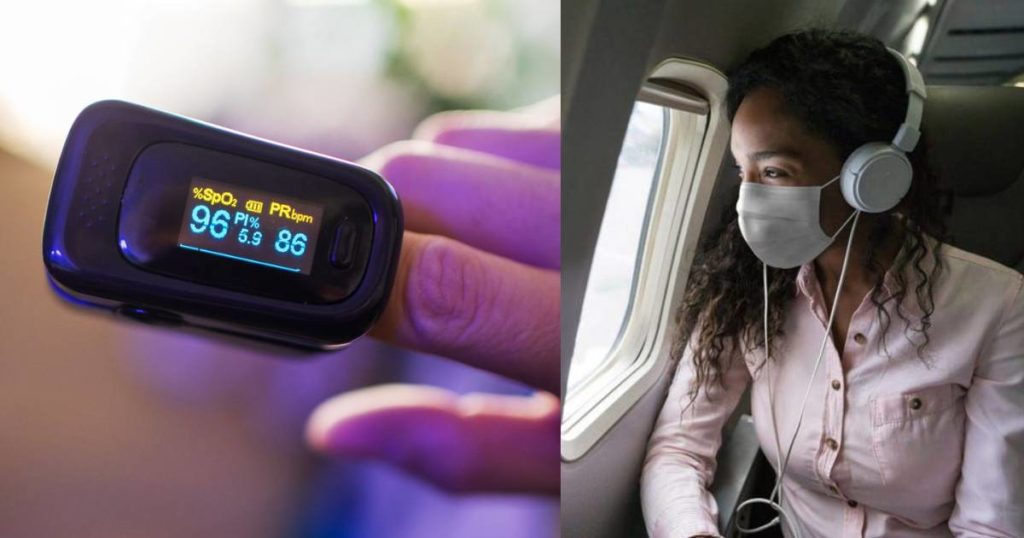With the mounting number of cases, now is the worst time for both domestic and international travel. But if you must travel for emergency purposes, the best way to do it is to be well-prepared before you step out. While venturing to a new location via any form of transportation can be nerve-racking, we got you a comprehensive list of all the travel essentials that will help you stay as safe as possible.
1. Fever & Cold Medications
Both paracetamol and crocin can relieve pain and bring down a fever. Depending on whether you have a cold, the flu, or even infected with COVID-19 during your travel, your doctor may recommend one over the other. Consult your doctor over about which may be right for you, and be sure to have some on hand. If you have children, make sure you have appropriate medicine for them, as it may differ from what adults need.
2. Oximeter
Since the pandemic has hit the world the oximeters have become a necessity even during travels. Coronavirus impacts the oxygen saturation in the bloodstream and it can occur in anyone, even if the infected person has no other symptoms. Therefore, it is imperative to monitor your oxygen levels regularly.
3. Thermometer
Carry a thermometer to keep a constant check on your medical condition. This will allow you to ensure proper safety and also help in avoiding the spread of any kind of infection. Can It Be Safe To Travel After The First Dose Of Vaccination? Here’s What You Need To Know.
4. Vitamin C Supplements
Carry some vitamin C supplements to keep your immunity in tip-top shape during your travels. The water-soluble vitamin is known for its role in supporting a healthy immune system and it is extremely important to fight any infection in your body. Sufficient intake of this nutrient in the diet can heal wounds, repair, and even maintain healthy bones.
5. Diabetes, Hypertension & Other Medications If You Suffer From Comorbidities
If you take prescription medications of any kind, carry some extra doses in hand. We are living in very uncertain times and with the lockdowns and travel bans in place, getting access to a pharmacy may not be all that easy. Carrying extra medications is especially important if you have comorbidities like heart disease, lung disease, or diabetes.
6. Single-Use Gloves
Have single-use latex or nitrile rubber gloves on hand during your travels which you can replace every once in a while during the day. Plus, gloves will keep you from reaching your hands to your face which you may subconsciously touch without the gloves. Take care to touch only the inner surface while removing them. Wash your hands beforehand and afterward. However, remember to sanitise your hands even if you are wearing gloves.
7. Surgical Masks For Double Masking
Masks have been made mandatory, so you will not miss out on the face mask. But when you are travelling, always carry a few extra masks along with you. Besides, doctors are now prescribing double masking to contain the spread of the mutant variants. The right way of double masking is to wear a surgical mask and then layer it with a cloth mask. However, be sure to replace your surgical masks. If you are wearing N95 masks you do not need double masking.
8. Face Shield
A lot of us think that a face shield is not essential, but let us not forget that it gives that needed protection to our eyes. Plus, you get double protection from the aerosols dispersed in the air from an infected person. Dining Out & Grocery Shopping More Dangerous Than Flying During Pandemic Reveals Study.
9. Disinfectant Wipes
The disinfectant wipes are a must-carry to wipe down the surroundings. When you are sitting on a bench or a seat stationed at the airport, you can wipe them clean first. The disinfectant wipes also come in handy to clean the meal table, armrests, and every other surface around you that could possibly have infectious droplets.
Also read: Travel During COVID-19 Outbreak: 10 Rules For A Safe Hotel Stay
10. Pocket-Sized Sanitiser Bottles
Sanitisers may be stationed at most places at the airport or the hotel, but carrying a few bottles along with you is also extremely important. It helps to avoid using sanitisers stationed at public places and ensures that you clean your hands every time you touch a common surface.
11. Your Essential Gadgets
Ensure that your essential gadgets like your smartphone, tablet and your laptop are in top shape for crucial communication. It is vital to stay in touch with your near ones while travelling during these challenging times. You may also need to download a COVID-19 application necessary for check-outs at airports. Do not forget to carry your portable charger to maintain the battery of your gadgets to do e-bookings and online transactions. You would want to avoid handling cash at all times to reduce the risk of contracting the virus.
Also, make sure you assess how you are feeling before your travel to feel confident that you’re not putting others at risk.

